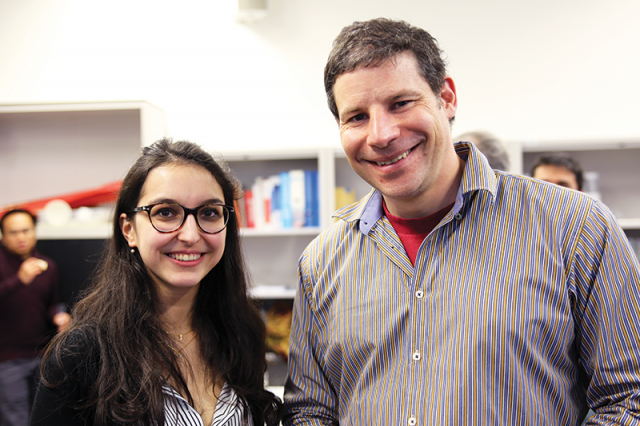The NCCR Chemical Biology awarded for the first time in 2017 the Best Master’s Thesis prize to Nour Lydia Mozaffari for her outstanding Master’s thesis. This honour acknowledges the exceptional achievement of a young scientist enrolled in the Master in Chemical Biology programme in terms of interdisciplinarity, originality, research progress, clarity of the written manuscript and mastery of the domain.

What is the topic of your master’s thesis?
The subject of my thesis is “Superresolution imaging of the TORC1 focus in Saccharomyces cerevisiae”. The work consisted investigating the function and regulation of TORC1 foci in yeast and studying their nanostructure in vivo. TORC1 is a master regulator of cell growth in eukaryotes, and it has been reported that it can assemble into foci under specific conditions.
When you first started at the University of Geneva you wanted to study new cancer therapies. How has your perception of research changed during your studies?
My long-term goal is still to work in cancer-related research, but my studies have allowed me to appreciate the vast extent and multidisciplinarity of this field. They have especially underlined the importance of understanding fundamental cellular processes in the investigation of the origins of disease and the development of efficient treatments.
During your thesis work you applied genetics, cell biology, biochemistry and biophysics in the Loewith group in Geneva and in the Manley group in Lausanne. How well did the master’s degree curriculum prepare you for these challenges?
My work during my Master thesis was quite different from the things I had seen in class, so it is a bit tricky to answer that question. Regarding basic biochemistry, cell biology and genetics techniques used during my thesis, I had already had some teaching during my bachelor’s studies, and most of the techniques I used were also discussed again during the master’s programme. However, I learned about them mostly during my time at the lab, with the help of the people I was working with. As for more specific and advanced techniques, such as biophysics and superresolution microscopy, I found the tutorial course especially useful. It also helped me in my choice of project, because I was able to better understand which techniques are used in each lab and how they are applied in research. I think that the degree’s curriculum in general is a very good preparation for the thesis, since it has a specific focus on practical work and research.
What was the most interesting experience during your Master’s thesis?
What I found most exciting was the highly collaborative nature of the project I was working on. It was a great experience to be able to work and exchange views with scientists from different backgrounds and areas of expertise. Throughout my thesis, I had the opportunity to work closely with scientists from two different research groups and learned a lot about the different techniques. It was a very interesting and enriching experience.
What would you do differently if you could start your master’s degree all over again?
If I could start again, I wouldn’t change much regarding my curriculum, as the programme fully met my expectations and even more. One thing that I might do differently would be to take additional classes, so as to broaden and deepen my theoretical knowledge in the various fields encompassed by chemical biology. Regarding the practical part of the programme, I am very happy to have chosen this path, and wouldn’t want to do anything differently.
What are your plans for the future?
I plan to continue my studies and start a PhD, but before that I would like to take few months off to try to get a feeling of how things work outside academic research. I hope to find a position in a pharmaceutical or biotech company in order to gain some practical experience in a different setting than university.

Leave a comment
The editors reserve the right not to publish comments or to abridge them.